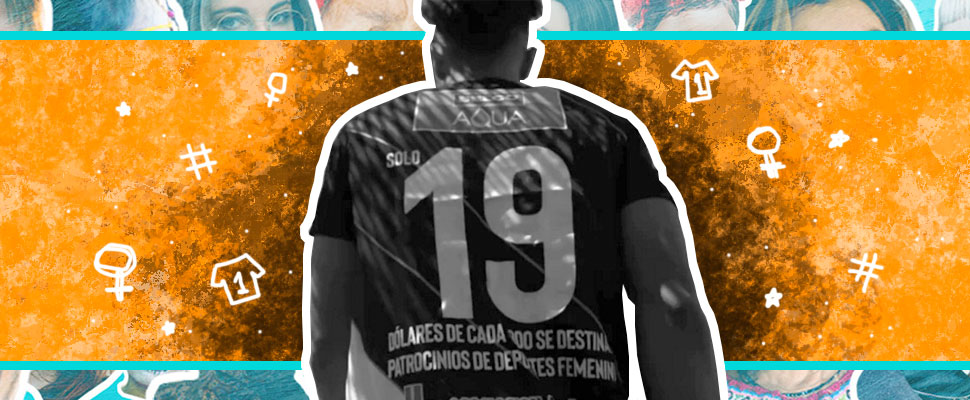This is how discrimination and harassment in sports are fought
In Chile an office emerged on the subject, while the Danubio of Uruguay gives a message on its shirt through which they protest against gender inequality

Escucha este artículo
Leer en español: Así se combaten la discriminación y el acoso en el deporte
Sexual harassment is an issue that has become very sensitive, and over the years it has been affecting sports with several situations that have occurred. For example, in the United States, there was an unfortunate situation with the gymnastics selection that caused several countries to take measures. For this reason, several countries implemented strategies in each of their sports federations to avoid this type of unfortunate events.
Leer en español: Así se combaten la discriminación y el acoso en el deporte
This is how in Chile the Office for Respect in Sport was created, which aims to prevent and fight against the mistreatment of national athletes. At the same time, and taking advantage of the fact that March is the month of Women, the Danubio soccer club of Uruguay will denounce gender inequality on its shirt. LatinAmerican Post analyzes in depth these two facts in which through sport it seeks to eradicate these strong problems.
Acá les dejo esta bonita lección señores @Dimayor @FCFSeleccionCol Y parece que no sobra recordarles que los hechos valen mucho más que las palabras e incluso que campañas como esta. A ustedes @DanubioFC mi aplauso por esto. CC @soccer_girl82 @PinoCalad @cesaralo @josasc https://t.co/zm9mCoiGPP
— Daniel Bernal (@dgbernal) 8 de marzo de 2019
Comité Olímpico de Chile crea la oficina del respeto por el deporte. Para tratar temas de acoso y abuso que han ocurrido en algunas disciplinas.
— Aníbal (@pgomezs_c13) 13 de diciembre de 2018
Maybe you're interested in reading: This is the soccer player who fights for gender equality in Argentina
Action plan in Chile
The president of the Chilean Olympic Committee, Miguel Ángel Mujica, told Mercurio that the federations were consulted on the protocol and there was nothing. He added in a registered publication by Vivimos la noticia, that as leaders they were not prepared to deal with this kind of situation.
To fulfill this objective, they contacted the lawyer María Loreto González, a specialist in cases of sexual violence and Judo leader. "This unit will have three main axes, that of prevention, accompaniment, and observatory," González told As that it should be noted that Chile's Olympic Committee has had the support of the Ministry of Women, Sports and the Foundation for Trust.
In order to eradicate inequality
The Danubio of Uruguay announced that in March, women's month, they will not use common numbers on their shirts to combat a problem. In the squad, numbers from 1 to 25 are used, which represent a figure that reflects the inequality that exists between genders in today's society. One of the messages that will be disseminated by the T-shirts are "every 3 hours there are 12 complaints about the constant mistreatment of women".
This team, better known as 'La Franja', indicated that women have played a very important role throughout their history as a club. Univision noted that the name of the team was chosen by a woman, and its stadium was the first to be named after a lady.
"We will play in black and in those shirts all the players will have a number up and down," said Juanjo Matri in a Fox Sports registry. Likewise, Matri, who is the press chief of the club, assured the reported media that a gender inequality was formed.
He also stressed that violence against women will be addressed, everything that goes against the feminist cause and what they believe should be communicated. In order to make the t-shirts, data was obtained from UN Women and Women from the Social Development of Uruguay, which was promoted in the networks.
In 2018, the Uruguayan team held a campaign in the women's month with the phrase "all from the same side, the only way we all win." This club was founded in 1932, and at the beginning the name was going to be Maritza, but the proposal was discarded because it was very feminine. As a result of this fact, María Mincheff suggested the name of Danubio, which is the most important river in her native land.
Only 5% of media coverage corresponds to women's sports in the world. Milenio emphasized that of every 10 positions, only 2 are women. The media mentioned with great concern that women only make up part 14% of the Uruguayan ministerial cabinet.
These two Latin American entities promote programs and projects in order to combat two problems such as gender inequality and harassment.
LatinAmerican Post | Daniel Cuevas
Translated from "Así se combaten la discriminación y el acoso en el deporte"




